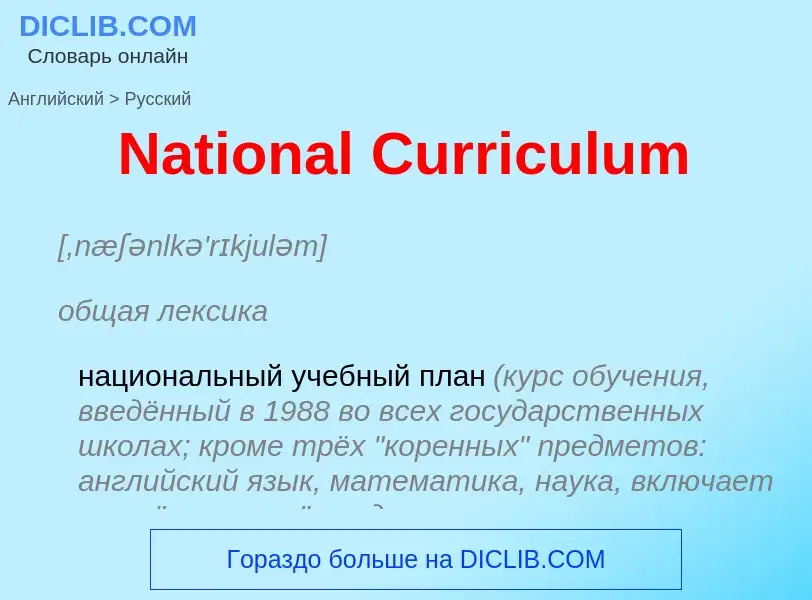Traducción y análisis de palabras por inteligencia artificial ChatGPT
En esta página puede obtener un análisis detallado de una palabra o frase, producido utilizando la mejor tecnología de inteligencia artificial hasta la fecha:
- cómo se usa la palabra
- frecuencia de uso
- se utiliza con más frecuencia en el habla oral o escrita
- opciones de traducción
- ejemplos de uso (varias frases con traducción)
- etimología
National Curriculum - traducción al ruso
[,næʃənlkə'rɪkjuləm]
общая лексика
национальный учебный план (курс обучения, введённый в 1988 во всех государственных школах; кроме трёх "коренных" предметов: английский язык, математика, наука, включает семь "основных" предметов: историю, географию, технологию, музыку, искусство, физическое воспитание и, в средних школах, современный иностранный язык; контрольные и экзамены по всем предметам проводятся в возрасте 7, 11, 14 и 16 лет)
[kə'rikjulə]
общая лексика
от curriculum
Definición
Wikipedia
A national curriculum is a common programme of study in schools that is designed to ensure nationwide uniformity of content and standards in education. It is usually legislated by the national government, possibly in consultation with state or other regional authorities.
National curriculum assessment generally means testing of students as to whether they meet the national standards.
Notable national curricula are:
- Australian Curriculum is a planned curriculum for schools in all states and territories of Australia, from Kindergarten to Year 12. Its first stages were planned to start in 2013.
- National Curriculum and Textbook Board for Bangladesh.
- National Curriculum Framework (NCF 2005) for India
- in the United Kingdom:
- National Curriculum for England, in force in part since 2014 and in full since 2016
- Northern Ireland Curriculum
- Curriculum for Excellence in Scotland
- National Curriculum for Wales (2008 to 2026), in force since 1999
The United States notably does not have one. The establishment of a national curriculum was explicitly banned in 1965, in Section 604 of the Elementary and Secondary Education Act (since moved to Section 2302 and codified at 20 U.S.C. § 6692). This act provided federal funding for primary and secondary education ('Title I funding') as part of President Lyndon B. Johnson's War on Poverty. However, most states in the United States voluntarily abide by the Common Core State Standards Initiative, which provides certain uniform standards. See Education in the United States.


![Open Curriculum]] in 2019 Open Curriculum]] in 2019](https://commons.wikimedia.org/wiki/Special:FilePath/Brown's Open Curriculum banner.jpg?width=200)

![[[Shimer College]] students discussing texts in the school's core curriculum. [[Shimer College]] students discussing texts in the school's core curriculum.](https://commons.wikimedia.org/wiki/Special:FilePath/Shimer IS 5 fall 1994 Sappho Bible.jpg?width=200)
